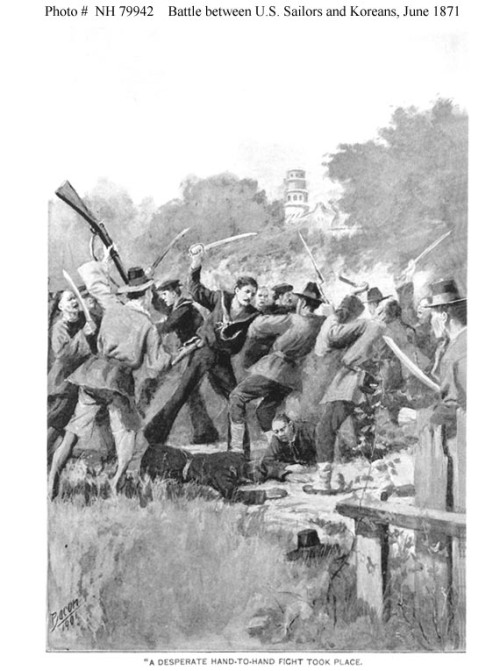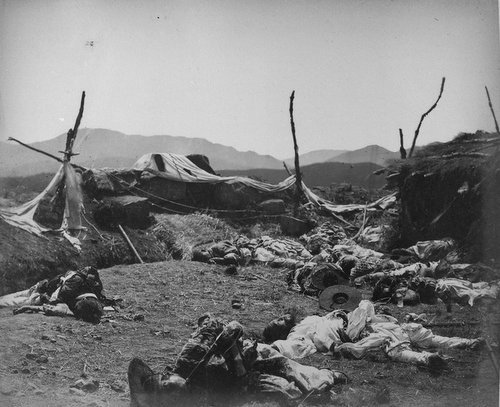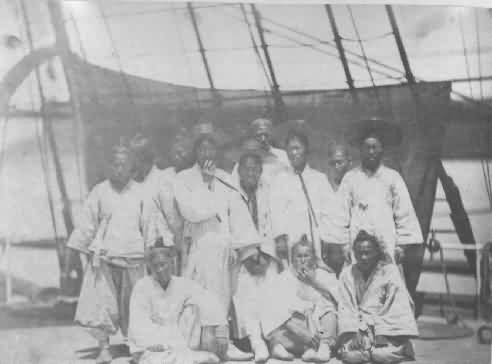peashooter85:The first US military intervention in Korea — The Korean Expedition of 1871Trouble with
peashooter85:The first US military intervention in Korea — The Korean Expedition of 1871Trouble with North Korea has become especially heated as the insular nation continues to make threats of war and nuclear weapons. The whole situation began in 1950 with the Korean War, in which communist North Korea invaded the western backed nation of South Korea. The United States and the United Nations intervened, protecting South Korean sovereignty but continuing a generation’s long conflict of military rivalry and brinksmanship. Today North Korea, South Korea, and the United States are still technically in a state of war, as no peace treaty was ever signed.However, the Korean War was not the first US military action in Korea. In 1871 Korea was a kingdom ruled by the Joseon Dynasty. A very isolationist nation, Korea wished to avoid interference by the many European and western imperial powers that were dominating the world both militarily and economically. The United States wanted to end this isolationism, as trade with the Far East was a very lucrative business. In 1866 the merchant ship SS General Sherman docked at Pyongyang to open up trade relations with the west. While details are fuzzy, the mission turned into a gun battle in which most of the General Sherman’s crew were killed. (As an aside; in modern day North Korea historians claim that the assault on the General Sherman was led and planned by a direct ancestor of North Korean dictator Kim Il-Sung.)In 1871 an expedition of five US Navy warships was sent to Korea to open trade relations with the kingdom and ascertain the fate of the SS General Sherman. The expedition was reminiscent of Commodore Perry in Japan, who forced the Japanese to open trade relations at the barrel of a gun two decades earlier. The Americans were fairly certain that a show of force using US military muscle would convince the Koreans to see things their way. They were wrong. The US fleet made contact with the Koreans. Explaining they only wished to explore the coastline, the fleet sailed up the Han River, which led to the capital of Hanyang (Seoul). Seeing this move as a threat, Korean shore batteries opened fire on the warships. Despite bombardment for fifteen minutes, the American fleet suffered little damage as the Korean gunners were not particularly skilled. The incident, however, would lead to bloodshed.The United States demanded an official apology from Korea within ten days. When the American consulate received none a punitive expedition was organized. On June 10th, 1871 an amphibious assault of 546 sailors and 105 marines landed on Gangwha Island and captured a series of forts and garrisons which guarded the entrance to the Korean capitol. The Koreans had no chance as US firepower and military technology far exceeded that of the Koreans. American sailors and marines quickly stormed the citadels as naval guns provided cover for the assault. The Korean soldiers were armed with matchlock muskets, crude and unreliable firearms which only fired a few shots a minute and where outdated in Europe by the 1700’s. The American troops, however, had Remington Rolling Block breechloading rifles, a new type of service arm which fired self-contained metallic cartridges, could fire around a dozen shots a minute, and was the latest in military technology. Though the Korean’s fought fiercely, American firepower and technology was too much to bear. The US suffered only 3 deaths and 10 wounded while the Koreans suffered 243 dead with 20 captured. Nine sailors and six marines were awarded the Medal of Honor for their actions at the Battle of Gangwha.After the battle the Americans tried to use their twenty prisoners as bargaining chips to force the Koreans to negotiate. The Koreans refused to bargain and actually strengthened their policy of isolationism. Eventually US forces were ordered to withdraw from Korea, with the expedition being seen as a failure. In 1876 the Japanese became the first nation to open up trade with Korea; by threatening to bombard Seoul with a fleet of warships. Soon afterwards treaties with western powers were concluded as well. The first treaty with the United States was signed in 1882 without further bloodshed. -- source link
Tumblr Blog : peashooter85.tumblr.com


